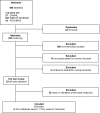The unfulfilled promise: a systematic review of interventions to reduce the unmet supportive care needs of cancer patients
- PMID: 22089430
- PMCID: PMC3244607
- DOI: 10.1007/s00520-011-1327-1
The unfulfilled promise: a systematic review of interventions to reduce the unmet supportive care needs of cancer patients
Abstract
Purpose: This review aimed to examine (a) trends in the number of publications on unmet needs over time and (b) the effectiveness of interventions designed to reduce unmet needs among cancer patients.
Methods: An electronic literature search of Medline to explore trends in the number of publications on patients' unmet needs and an additional literature search of Medline, CINAHL, PsychINFO, and Web of Science databases to identify methodologically rigorous research trials that evaluated interventions to reduce unmet needs were conducted.
Results: Publications per year on unmet needs have increased over time, with most being on descriptive research. Nine relevant trials were identified. Six trials reported no intervention effect. Three trials reported that intervention participants had a lower number of unmet needs or lower unmet needs score, compared to control participants. Of these, one study found that the intervention group had fewer supportive care needs and lower mean depression scores; one study found that intervention participants with high problem-solving skills had fewer unmet needs at follow-up; and one study found an effect in favor of the intervention group on psychological need subscale scores.
Conclusions: Reasons for varying results across trials and the limited effectiveness of unmet needs interventions are more broadly discussed. These include inadequacies in psychometric rigor, problems with scoring methods, the use of ineffective interventions, and lack of adherence to intervention protocols.
Figures
References
-
- National Breast Cancer Centre and National Cancer Control Initiative (2003) Clinical practice guidelines for the psychosocial care of adults with cancer. Available at http://www.nhmrc.gov.au/publications/synopses/cp90synhtm. Accessed 2011 - PubMed
-
- Fitch M. Supportive care for cancer patients. Hosp Q. 2000;3(4):39–46. - PubMed
Publication types
MeSH terms
Grants and funding
LinkOut - more resources
Full Text Sources



